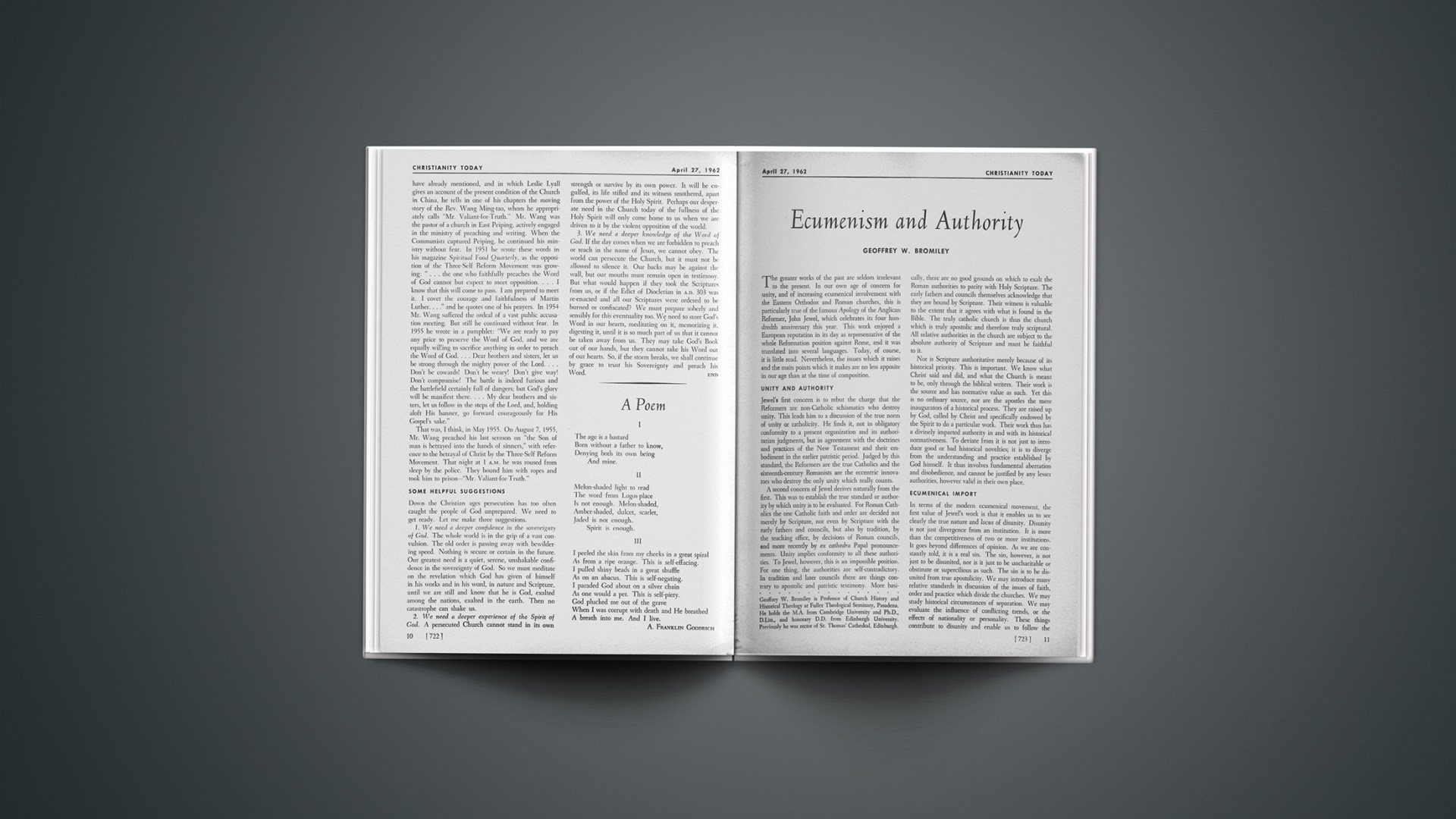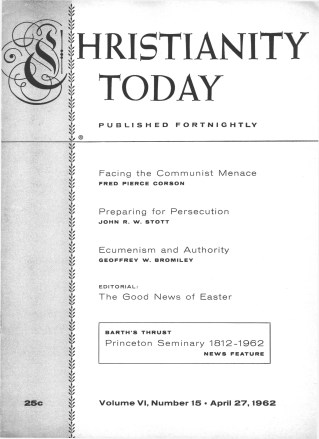The greater works of the past are seldom irrelevant to the present. In our own age of concern for unity, and of increasing ecumenical involvement with the Eastern Orthodox and Roman churches, this is particularly true of the famous Apology of the Anglican Reformer, John Jewel, which celebrates its four hundredth anniversary this year. This work enjoyed a European reputation in its day as representative of the whole Reformation position against Rome, and it was translated into several languages. Today, of course, it is little read. Nevertheless, the issues which it raises and the main points which it makes are no less apposite in our age than at the time of composition.
Unity And Authority
Jewel’s first concern is to rebut the charge that the Reformers are non-Catholic schismatics who destroy unity. This leads him to a discussion of the true norm of unity or catholicity. He finds it, not in obligatory conformity to a present organization and its authoritarian judgments, but in agreement with the doctrines and practices of the New Testament and their embodiment in the earlier patristic period. Judged by this standard, the Reformers are the true Catholics and the sixteenth-century Romanists are the eccentric innovators who destroy the only unity which really counts.
A second concern of Jewel derives naturally from the first. This was to establish the true standard or authority by which unity is to be evaluated. For Roman Catholics the one Catholic faith and order are decided not merely by Scripture, nor even by Scripture with the early fathers and councils, but also by tradition, by the teaching office, by decisions of Roman councils, and more recently by ex cathedra Papal pronouncements. Unity implies conformity to all these authorities. To Jewel, however, this is an impossible position. For one thing, the authorities are self-contradictory. In tradition and later councils there are things contrary to apostolic and patristic testimony. More basically, there are no good grounds on which to exalt the Roman authorities to parity with Holy Scripture. The early fathers and councils themselves acknowledge that they are bound by Scripture. Their witness is valuable to the extent that it agrees with what is found in the Bible. The truly catholic church is thus the church which is truly apostolic and therefore truly scriptural. All relative authorities in the church are subject to the absolute authority of Scripture and must be faithful to it.
Nor is Scripture authoritative merely because of its historical priority. This is important. We know what Christ said and did, and what the Church is meant to be, only through the biblical writers. Their work is the source and has normative value as such. Yet this is no ordinary source, nor are the apostles the mere inaugurators of a historical process. They are raised up by God, called by Christ and specifically endowed by the Spirit to do a particular work. Their work thus has a divinely imparted authority in and with its historical normativeness. To deviate from it is not just to introduce good or bad historical novelties; it is to diverge from the understanding and practice established by God himself. It thus involves fundamental aberration and disobedience, and cannot be justified by any lesser authorities, however valid in their own place.
Ecumenical Import
In terms of the modern ecumenical movement, the first value of Jewel’s work is that it enables us to see clearly the true nature and locus of disunity. Disunity is not just divergence from an institution. It is more than the competitiveness of two or more institutions. It goes beyond differences of opinion. As we are constantly told, it is a real sin. The sin, however, is not just to be disunited, nor is it just to be uncharitable or obstinate or supercilious as such. The sin is to be disunited from true apostolicity. We may introduce many relative standards in discussion of the issues of faith, order and practice which divide the churches. We may study historical circumstances of separation. We may evaluate the influence of conflicting trends, or the effects of nationality or personality. These things contribute to disunity and enable us to follow the process and apportion the responsibility. But they remain on the surface if taken in isolation. For ultimately the disunity which really counts, which is truly sinful, which demands investigation and which must he restored for true reunification, is departure from the apostolic standard. No ecumenical analysis which misses this issue, no discussion or plan which evades it, can bring the unity of the body of Christ which is so much desired and sought in the modern ecclesiastical world.
If this is so, however, then the central ecumenical issue is still that of the Reformation, namely, that of authority. Truly to know disunity we must measure what is by what should be. Truly to establish unity, we must bring what is into conformity with what should be. But to do this, we must have the norm by which to know what should be. Only the right standard can reveal disunity and help to unity. The wrong standard must inevitably breed disunity, prevent its basic understanding and hinder any attempts at its removal.
Modern Rationalism
Since the time of Jewel a new authority has come to dominate the Protestant world. This is reason. In some cases it may be hostile to Scripture, in others complementary, in others friendly; but always it claims superiority. Now reason is not to be despised. The Reformers, too, recognized that divine truth is not irrational, that the Logos is supremely logical, and that reason, purified and directed by the Spirit, has its own function. But reason alone or supreme makes an unfortunate master. It is anthropocentric, fallible and disruptive. It entails a clash of opinions which can be resolved only by compromise, relativism or abstraction. Little help is to be expected from it either in the profounder analysis of disunity or in approximation to true unity. Where reason is falsely enthroned, disunity is established.
In general, however, the promotion of reason as a supreme norm has been eccentric to the main development of the church. Neo-Protestant illusions should not blind us to the fact that this is still so today. The main challenge to Scripture has been, and is, from the related but rather different exaltation of tradition, the confessions, or the teaching office. This is not directly hostile to the Bible. Nor is it wrong in itself, for all churches can and should attribute some authority to their fathers, creeds, councils and authorized interpreters. The mischief enters when this relative authority is turned into an absolute alongside and finally above the Bible. As such it inevitably limits and muffles the authority of Scripture. And in so doing it forfeits its own pretended absoluteness, abandoning the solid truth of God to human change and novelty. It thus brings itself into inevitable conflict both with the Bible and with itself. The final result is the disunity of deviation from the apostolic norm, the forfeiture of any hope of true unity, and the probable attempt to impose a spurious counterfeit.
The Role Of Scripture
The only real hope for the ecumenical movement, or for the unity which it desires, is a return to real apostolicity in terms of the prophetic and apostolic authority of Scripture. This is a hard way. It involves a sharp and painful exposure of the real nature and ground of disunity. It makes compromise, evasion or self-complacency impossible. Yet it is an eminently fruitful way. It works back through the secondary complications to the solid ground which is common ground. It means the subjugation of all lesser authorities to the final norm, and therefore the overcoming of the differences, not by compromise, but by correction. It holds out hope for reconstruction in which the voices of the past are heard, and reason can do its proper work, but both positively and negatively the apostolic norm holds sovereign sway. It means the abandoning of unapostolic disunity in principle, and therefore the patient, humble, prayerful, obedience of faith in seeking the real unity which rests on the foundation of the apostles and prophets, Jesus Christ himself being the chief cornerstone.
Whether those who absolutize secondary authorities will follow this Way, one cannot tell. If not, the ecumenical movement is an illusion indeed. Even if evoked by the Spirit, it resists the Spirit. It is thus left with no option but continuing disunity or false unity. Yet the circumstance of the day present the invitation to this hard but fruitful way as they did at the time of the Reformation. Within the ecumenical movement itself, there are the more perspicacious who see that this is the right way which is also the only way. And either within the ecumenical movement or outside it, evangelical theology has a special ability and responsibility to assist at this vital point. What is required of it is neither carping criticism nor the dialogue which aims at no more than harmonization. It is the positive presentation of a theology and practice which uncover the real issue and set a right example by their own faithful adherence to the apostolic norm. It is the patient but persistent discussion, in word or writing, which bores back insistently to the bedrock of apostolic authority. It is the achievement of such evangelical unity under the Word of God that the many variations in evangelical faith, order and practice may be discussed, not in terms of relative authorities alone, but supremely in submission to, and reformation by, the one authority which is the guarantee of real catholicity and therefore of solid and inviolable unity.










